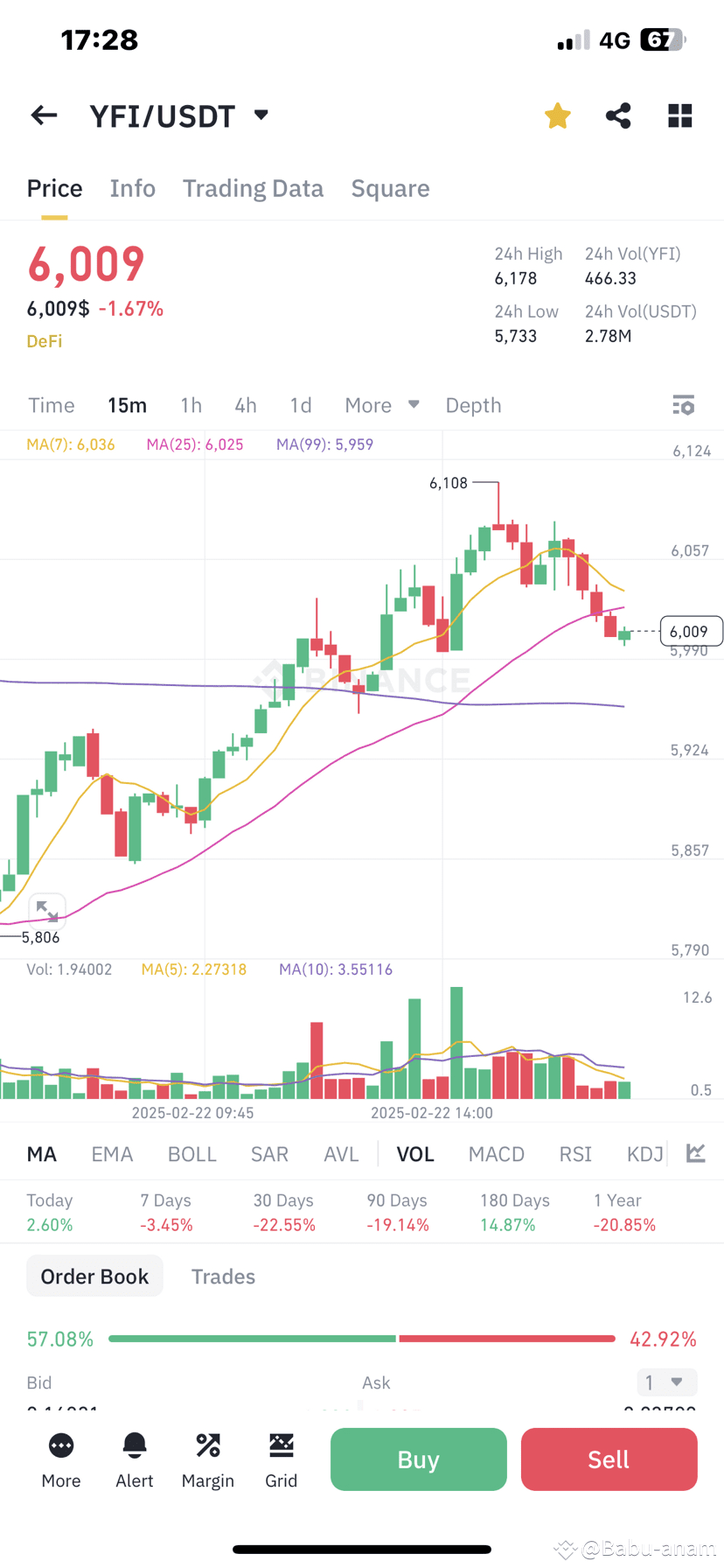Expert Forecasts:
• DigitalCoinPrice: This platform predicts that YFI could reach approximately $12,479.80 by December 2025, suggesting a potential doubling from its current value.
• CoinLore: According to their analysis, YFI might attain a price of $97,893 by 2025, indicating a substantial increase.
• Cryptopolitan: This source suggests that YFI has a promising long-term future, especially if the decentralized finance (DeFi) sector continues to grow and evolve.Historical Performance:
• 2020 Surge: Launched in February 2020, YFI experienced a meteoric rise, reaching an all-time high of approximately $43,739 in September 2020. This surge was followed by a correction, with the price dropping to around $9,662 before the next upward movement.
.2021 Peak: In May 2021, YFI achieved another significant peak, with prices soaring to around $79,749.
Considerations:
• Market Volatility: Cryptocurrency prices are notoriously volatile, and past performance does not guarantee future results.
• DeFi Sector Growth: YFI’s value is closely tied to the performance and adoption of the DeFi sector. Continued innovation and user engagement in DeFi could positively influence YFI’s price.
• Regulatory Environment: Changes in regulations affecting cryptocurrencies and DeFi platforms can significantly impact YFI’s price trajectory.
---
### Key Technical Indicators to Analyze:
1. Support and Resistance Levels:
- Identify key support (price levels where buying pressure may increase) and resistance (price levels where selling pressure may increase) on the chart.
- Example: If YFI has historically struggled to break above $15,000, that could be a strong resistance level.
2. Moving Averages (MA):
- 50-day MA and 200-day MA: A crossover of the 50-day MA above the 200-day MA (Golden Cross) is a bullish signal, while the opposite (Death Cross) is bearish.
- Example: If YFI's price is consistently above the 200-day MA, it could indicate a strong uptrend.
3. Relative Strength Index (RSI):
- RSI measures overbought (above 70) or oversold (below 30) conditions. During a bull run, RSI can stay in the overbought zone for extended periods.
- Example: If YFI's RSI is above 70 but not showing divergence, it could indicate strong momentum.
4. Volume:
- Increasing trading volume during price rallies confirms bullish momentum. Low volume during price increases may indicate weak participation.
- Example: A breakout above a resistance level with high volume is more likely to sustain.
5. Fibonacci Retracement:
- Use Fibonacci levels (23.6%, 38.2%, 50%, 61.8%) to identify potential retracement levels during a bull run.
- Example: If YFI retraces to the 61.8% level during a pullback, it could be a good buying opportunity.
6. Trendlines:
- Draw trendlines to identify the direction of the trend. An upward-sloping trendline indicates a bullish trend.
- Example: If YFI's price consistently bounces off an upward trendline, it confirms bullish sentiment.
---
### Example Analysis (Hypothetical Scenario):
Let’s assume YFI is currently trading at $10,000 and has the following technical setup:
- Support Levels: $8,000 (strong support), $6,500 (major support).
- Resistance Levels: $12,000 (immediate resistance), $15,000 (previous ATH resistance).
- Moving Averages: 50-day MA ($9,500) is above the 200-day MA ($8,000), indicating a bullish trend.
- RSI: 65 (approaching overbought but still has room for upward movement).
- Volume: Increasing volume during price rallies, indicating strong buyer interest.
Bullish Scenario:
- If YFI breaks above $12,000 with high volume, the next target could be $15,000 (previous ATH). A breakout above $15,000 could lead to a parabolic move toward $20,000 or higher.
Bearish Scenario:
- If YFI fails to break $12,000 and falls below the 50-day MA ($9,500), it could retest the $8,000 support level.
---
### Tools for Technical Analysis:
- TradingView: Use this platform to analyze YFI's price chart with various indicators and drawing tools.
- CoinGecko/CoinMarketCap: Track YFI's price, volume, and market cap.
- On-Chain Data: Use platforms like Glassnode or Santiment to analyze on-chain metrics (e.g., whale activity, exchange flows).
---
### Final Note:
Technical analysis is a useful tool, but it should be combined with fundamental analysis and market sentiment to make informed decisions. Always use risk management strategies (e.g., stop-loss orders) to protect your investments.

